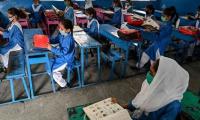HONG KONG: China will no longer send children overseas for adoption, the government said, overturning a more than three-decade rule that was rooted in its once strict one-child policy.
More than 160,000 Chinese children have been adopted by families across the world since 1992, when China first opened its doors to international adoption.
Around 82,000 of these children, mostly girls, have been adopted in the United States, according to China’s Children International (CCI).
On Thursday, Foreign Ministry Spokeswoman Mao Ning said the Chinese government had adjusted its cross-border adoption policy to be “in line” with international trends.
“Apart from the adoption of a child or stepchild of blood relatives of the same generation who are within three generations of foreigners coming to China to adopt, China will not send children abroad for adoption,” Mao said.
“We express our appreciation to those foreign governments and families, who wish to adopt Chinese children, for their good intention and the love and kindness they have shown,” she added.
It was not immediately clear what would happen to families who were in the process of adopting children from China.
The rule change comes as Chinese policymakers struggle to encourage young couples to get married and have children after the population fell for two consecutive years.
China has one of the lowest birth rates globally and has been trying to incentivise young women to have children. Many, however, have been put off by the high cost of childcare, worries over job security and their future outlook as growth in the world’s second largest economy slows.
China implemented a rigorous one-child policy from 1979-2015 to reduce its population. When families were restricted to having only one child, many opted to keep male children, who are traditionally expected to be the main caregivers for their families, and give up females for adoption.
China’s move to halt international adoptions comes after the Netherlands in May banned its citizens from adopting children from foreign countries. In Denmark, people will no longer be able to adopt children from abroad after the only adoption agency said it was stopping operations.







